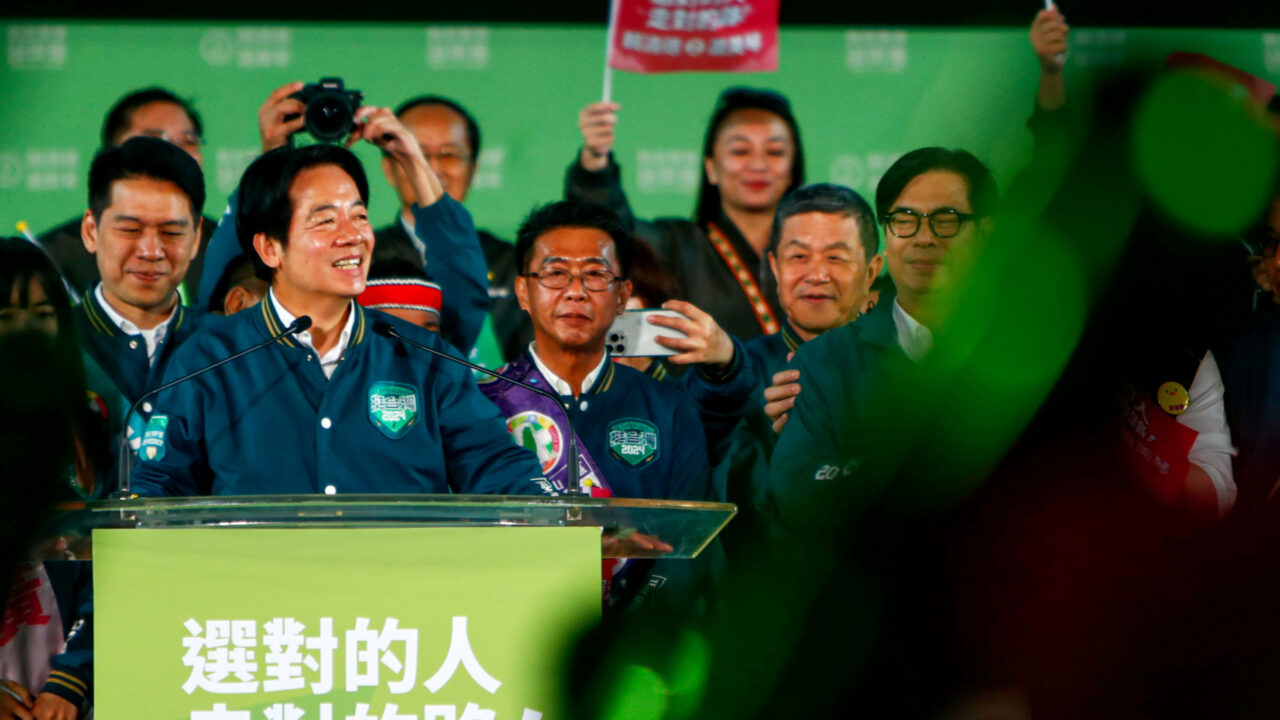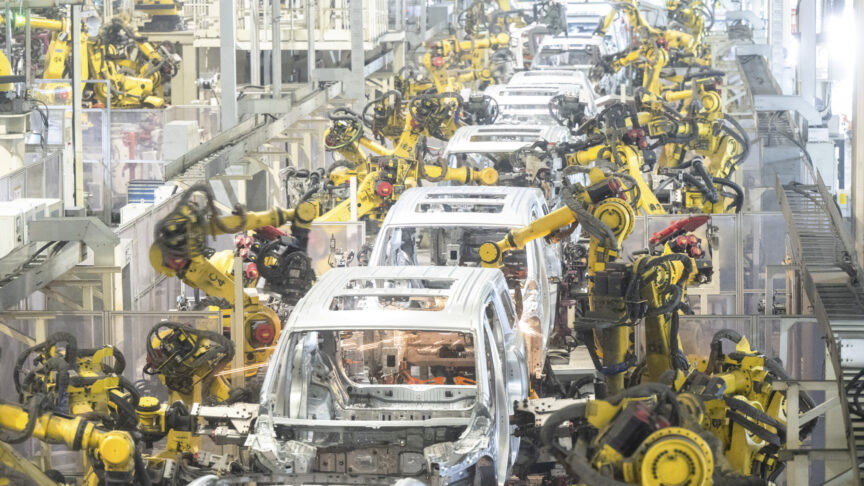The red flags ahead: What to expect from Taiwan’s election
Tensions over Taiwan are likely to rise in the aftermath of this weekend’s election, regardless of who wins. The next president will seek closer ties with Europe, which will necessitate a more coherent and unified policy
Taiwan’s voters will elect a new president on 13 January, following a closely fought election campaign. Polls show a small but consistent lead for Lai Ching-te of the ruling Democratic Progressive Party (DPP), whose eight years in power have been marked by deteriorating relations with China and closer ties to the United States. Beijing is still holding out hopes for a return of the opposition party Kuomintang (KMT) and its leader Hou Yu-ih, who has styled himself on the stump as the only candidate capable of avoiding war with China.
Whichever side wins, Taiwan looks set for a period of heightened tensions during early 2024 in advance of the new president’s inauguration in May, and one that will raise complex questions for both China and the US, as well as in Europe. Beijing is likely to test the incoming administration with military activity and other coercive tactics, especially if the DPP prevails. Europe has of late offered stronger public backing for Taiwan in the face of such actions. But rising geopolitical risks mean European leaders need to develop a more unified and coherent policy approach to Taiwan – beginning with a recognition that Europe has a greater role to play in supporting Taipei in the future.
Beijing is likely to test the incoming administration with military activity and other coercive tactics, especially if the DPP prevails
Growing global worries over Taiwan stem largely from China’s own anxiety about the island’s political direction. Polls suggest that only a tiny fraction of Taiwanese voters now support the island’s formal unification with China. Just 2 per cent of those polled in June 2023 said they would back unification as soon as possible.
The current election campaign has showcased divisions between the two main parties’ approaches to cross-strait relations. But it has also shown more fundamental trends across Taiwanese politics towards a new geopolitical consensus that is not favourable to Beijing. Both main parties now support greater military spending and moves to bolster deterrence with respect to China. Even the KMT, which has traditionally had close ties to Beijing, has now explicitly rejected any future model of unification based on China’s proposed “one country, two systems” model. It has also somewhat caveated its support for the traditional “1992 consensus”, a longstanding fudge in which Beijing and Taipei say they believe in “one China”, but quietly ignore questions about which of them is Taiwan’s legitimate government.
China fears a Lai administration would move to support formal independence, a step Beijing has often threatened to prevent with military action. Lai denies this. Instead, he promises broad continuity of the moderate policies of incumbent President Tsai Ing-wen. Beijing has nonetheless signalled its concern by strengthening messaging on the issue in recent months. China’s leader Xi Jinping recently described unification as an “historical inevitability”. He was reported to have delivered similarly blunt remarks in private to US president Joe Biden at their recent Sino-US summit.
Xi is thus highly likely to test the positions of any incoming government, especially if the DPP wins. Recent months have seen a steady increase in ‘grey-zone’ activity from Beijing, including pressuring Taipei by conducting increased naval and air patrols. China’s military has taken to flying unmanned balloons over the island, and most recently conducted a satellite overpass, prompting Taiwan’s government to issue an islandwide emergency air raid alert. In December, Beijing threatened renewed trade sanctions too.
The likely uptick in pressure after the election will raise complex questions for the US, as it attempts to de-escalate its own tensions with China. Washington has remained broadly neutral during the election campaign. US policymakers would prefer another DPP administration, although many worry privately that Lai might adopt a more confrontational tone than his predecessor, complicating Sino-US ties. Either way, there are clear risks that worsening ties between China and Taiwan, but also possibly between China and the US, could develop into a full-blown crisis. The military exercises China launched following the visit of US house speaker Nancy Pelosi to Taipei in 2022 give a sense of the alarming scenarios that might follow.
The prospect of heightened Chinese coercion will in turn see Taiwan’s new administration seek greater support from international partners. Beyond the US, Taipei will look first to ‘like-minded’ regional nations, including Australia, Japan, and South Korea. Forging closer links with India has also been a recent Taiwanese priority. But Taipei is likely to seek greater support from the European Union and its members too, building on the closer economic and diplomatic ties it has built with countries in the region in recent years. In the latter days of the campaign, Lai noted specifically in an interview that he would seek more support from Brussels and that he looked forward to “working together with Europe on peace in the Indo-Pacific region”.
Europe grew more willing to offer such support to Taipei during 2023. European Commission president Ursula von der Leyen repeatedly warned Beijing against using military force as it manages ties with Taipei. Some European countries, notably the Czech Republic and Lithuania, have agitated for more overt backing. Vilnius did so following a spat with Beijing over an upgrade of Lithuania’s ties with Taiwan, which included the opening of a Taiwanese Representative Office in Lithuania in 2021 and a subsequent Chinese economic coercion campaign. The salience of Taiwan has risen more generally in Europe, in part because of the war in Ukraine. Political leaders in eastern Europe have drawn parallels between Russian and Chinese aggression. A greater focus on economic de-risking has also brought attention to Taiwan’s crucial semiconductor sector.
That said, Europe also faces clear internal divisions. Much like the US, it is attempting to bed down a more stable relationship with Beijing, complicating any approach to Taipei. Returning from China in early 2023, French president Emmanuel Macron cautioned against US policies that might raise the risk of conflict. The EU’s foreign policy chief, Josep Borrell, wrote last September that Taiwan “should not embark on any unilateral declaration of independence” – a move that earned a public rebuke from Taiwan’s foreign ministry. To some degree such concerns reflect European public opinion. ECFR polling released last June suggested that less than one-quarter of respondents from a sample of European countries would be eager to support the US in the event of a future conflict over Taiwan, with roughly two-thirds wanting to remain neutral.
European leaders therefore need to develop a more unified position and explain it to their publics. A range of steps is required. High-level diplomacy between the EU and China can help to reassure Beijing of Brussels’s support for the status quo, while continuing to reinforce in public that coercive or military measures will come with significant costs. At the same time European leaders should take a less fearful approach to diplomacy with Taipei, recognising that they have a legitimate role in offering support in the face of coercion and threats of military action. It would help for European nations to coordinate much more closely over their Taiwan policy not just with the US, but also with important partners in the Indo-Pacific, such as Australia and Japan. Policymakers should also examine plausible future crisis scenarios, including those involving quarantines and blockades, and plan coordinated responses.
Tensions over Taiwan have risen sharply since the EU first launched its Indo-Pacific strategy in 2021. They are now likely to rise again. Increased military escalation in the Taiwan Strait would have grave economic and security consequences for Europe. Its leaders therefore need to find a new balanced and united approach to the island, which both supports Taiwan in the face of external pressure and works more closely with like-minded partners in the region. Getting that balance right during 2024 will be a major test of how ready the EU is to play a more serious role in the realm of Indo-Pacific security.
The European Council on Foreign Relations does not take collective positions. ECFR publications only represent the views of their individual authors.



